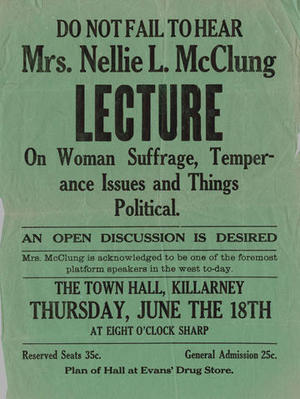- Women in the DCB/DBC
- Introduction
- Women Voting before 1851
- Coming Together to Demand the Vote
- The Right to Vote and Women’s Demands
- Relations with Militants and Organizations in Other Countries
- The Right to Vote in Municipal Elections
- The Right to Vote in Provincial and Territorial Elections
- The Right to Vote in Federal Elections
- Indigenous Women’s Right to Vote
- Opposition, Indifference, and Doubt
- Suggested Reading
The Right to Vote and Women’s Demands

Source: Link
Like many suffragists involved in the temperance movement, the physician Amelia LE SUEUR (Yeomans) was convinced that winning the right to vote would allow women to have a direct influence on legislation regulating alcohol:
“In her fight for women’s enfranchisement [Yeomans] admitted that ‘the suffrage has been and is the hardest of all reforms because it demands unselfishness in all men who support it.’ Yet she saw equal franchise as part of God’s plan for society. ‘Christ, when on earth, never gave any example to the men to keep the women silent, for many women followed and helped Christ while on earth.’ To have the vote was to have a voice, now denied women, in building society according to God’s plan. And God’s plan also involved temperance.
“Temperance was closely linked to suffrage in Yeoman’s view since women, the protectors of community morals and purity, would vote against ‘the liquor traffic.’”
More broadly, suffragists such as schoolteacher, author, mla, and civil servant Helen Letitia MOONEY (McClung) saw the vote as the key to improving relations between men and women:
“[McClung] identified male privilege as central to many problems, including family desertion, alcoholism, the appropriation of wives’ wages, domestic violence, custody battles, and farm-women’s isolation.”
The following biographies provide more information on the perceived connection between gaining women’s suffrage and achieving other demands:





